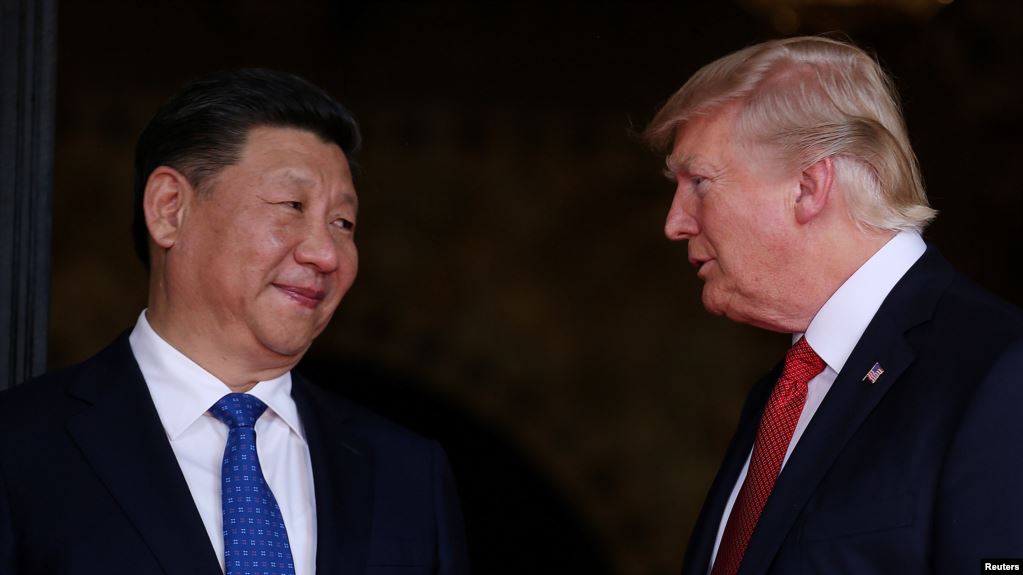What happens when the Yuan drops 7 to 1 USD?
"The RMB falling to the threshold of 7 to 1 USD can trigger a new wave of capital withdrawals, causing the RMB to sink even deeper, causing capital outflows in the short term to flow out stronger.


The battle of wits between President Donald Trump and President Xi Jinping continues new developments. (Illustration)
Less than a week after President Donald Trump announced that he would impose an additional 10 percent tariff on $300 billion of Chinese goods, the yuan fell to 7 to 1 dollar for the first time since 2008. This takes place in the context of investors speculating that China will let the local currency weaken to partially offset the negative impact of Donald Trump's threat to impose tariffs.
According to experts, the threshold of 7 yuan to 1 dollar is an important psychological milestone, which perhaps by many measures, the People's Bank of China (PBoC) has been "entrenched" for the past year.
But when investors saw the prospect of a trade war stalemate, they couldn't wait any longer. The depreciation of the yuan in the context of the Fed lowering interest rates also shows that this is more like a market reaction than a PBoC intervention.
In overseas markets, the price of the yuan (yuan) also fell sharply on August 5, at one point falling as much as 1.9% to 7.1114 yuan to 1 dollar.

The yuan fell to 7 to 1 dollar for the first time since 2008 after President Donald Trump's threat to impose tariffs. (Source: Bloomberg)
Meanwhile, in Vietnam, some argue that letting the yuan fall to 7 to 1 dollar is something the PBoC is actively doing, and could trigger a currency war to deal with high import tariffs.
However, according to Dr. Pham Sy Thanh, Director of the China Economic Research Program (VCES), when referring to currency war, public opinion needs to have a clear definition of this phrase.
"Suppose we define a currency war as a currency devaluation race, neither side will benefit. Given the economic conditions of both the US and China, devaluation of the local currency is not the optimal problem to solve the trade war." TS. Pham Sy Thanh said.
According to Mr. Cheng, one factor affecting China's monetary policy and exchange rate management is investor sentiment. Accordingly, there are 3 "weapons" being used by the United States, putting China at a disadvantage. At the same time, it pushed the psychology of investors in China into a state of insecurity.
"The U.S. is gradually pushing China out of the U.S. economy, making it impossible for China to benefit from the U.S. market and technology. Next, the U.S. is separating China from U.S.-owned ecosystems, based on the U.S. legal system. Finally, through many measures, the US is making the Chinese market risky in the eyes of investors.
Investors are very concerned about the prospects of the investment market, and no one puts their capital into a market where there are risks in terms of legal, interest rates and tax refunds. China is very worried, the RMB falling to the threshold of 7 to 1 USD can trigger a new wave of capital outflows (PV), causing the RMB to sink even deeper. The yuan sank deeply, causing capital outflows in the short term to flow out stronger. To stop that devaluation, the PBoC will most likely have to sacrifice foreign currency reserves to stabilize the exchange rate, as it lost $1 trillion to stabilize the yuan exchange rate in the 2015-2016 period. That's why China does not dare to devalue the yuan," Dr. Pham Sy Thanh analyzed.
According to Dr. Pham Sy Thanh said that the depreciation of the yuan (yuan) will not increase China's debt repayment burden, because China's foreign debt accounts for 10% of total debt, of which USD loans are not much.

TS. Pham Sy Thanh, Director of the China Economic Studies (VCES) program. (Photo: Internet)
Another factor related to the yuan exchange rate is US government bonds. Accordingly, in the context of the escalating US-China trade war, many international experts said that if China sells US government bonds in large quantities, it can push interest rates up and cause significant damage to the US economy.
However, according to Dr. Pham Sy Thanh, China's sell-off of US government bonds, on the contrary, will cause interest rates to fall, and the value of proceeds from the next bond sales China will decrease.
"After China sells US government bonds, it will collect USD, causing the yuan to rise, and then Chinese exports will be less competitive. Assuming China sells the entire batch of U.S. government bonds in the first sale, the dollar will bring exchange rate risk to China. While the PBoC's hedging asset is bonds, it has decreased by a significant amount. At the same time, it weakens China's financial leverage and its influence in the international arena," Dr. Pham Sy Thanh said.
On the US side, the Fed's move to lower the US dollar interest rate will weaken the dollar, but will have a supportive impact on economic growth, increase the number of jobs and the value of exports.
"President Donald Trump may want a weak dollar to support the economy rather than a strong dollar. In addition, the devaluation of the local currency is very difficult to take place in the US due to the independent nature of the relationship between the Fed and Mr. Trump. The Fed's move to lower interest rates is based on more economic observations, with the desire to deal with the US economic recession soon," Dr. Pham Sy Thanh said.
Related News

Foxconn pours $1.5 billion into Thanh Hoa to produce for Apple
14/2/2021

We have generated more than $1,200 billion in GDP
11/11/2020

Vietnam's economic growth forecast for the 4th quarter of 2020 and 2021: Will recover in a V-shape, in 2021 it will increase by about 6.5 - 7%
21/10/2020

Standard Chartered: Vietnam's GDP growth forecast of 3% in 2020 and 7.8% in 2021
20/10/2020

Samsung's outstanding moves in Vietnam and other countries in the "year of Covid-19"
20/10/2020
Featured Articles

Miza Group donated 3 billion VND in response to the contest movement "The whole country joins hands to remove temporary houses and dilapidated houses" in Thanh Hoa
7/6/2025

MIZA GROUP ENTERS THE TOP 10 GREEN VIETNAM ESG 2025 THANKS TO THE CIRCULAR ECONOMY DEVELOPMENT STRATEGY
27/6/2025

Miza (MZG) shares are officially listed on UPCoM
12/11/2024
